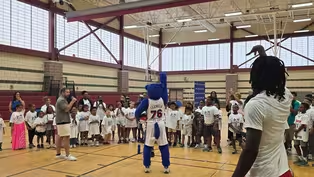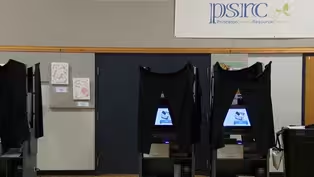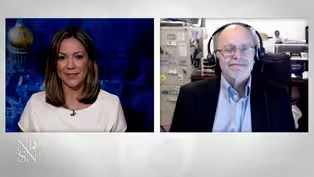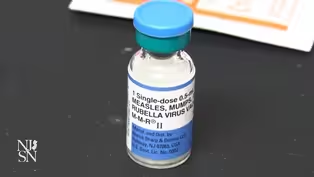NJ Spotlight News
What Trump cuts to 988 hotline mean for LGBTQ+ support
Clip: 8/8/2025 | 5m 1sVideo has Closed Captions
With 'Press 3' option gone, groups move to offer help
The end of a crucial support system for LGBTQ + youth has mental health advocates sounding the alarm and stepping up. The Trump administration last month officially ended the specialized “press 3” option on the 988 Suicide and Crisis Lifeline. This removes access to counselors trained to support LGBTQ young people at a time when mental health issues are on the rise.
Problems playing video? | Closed Captioning Feedback
Problems playing video? | Closed Captioning Feedback
NJ Spotlight News is a local public television program presented by THIRTEEN PBS
NJ Spotlight News
What Trump cuts to 988 hotline mean for LGBTQ+ support
Clip: 8/8/2025 | 5m 1sVideo has Closed Captions
The end of a crucial support system for LGBTQ + youth has mental health advocates sounding the alarm and stepping up. The Trump administration last month officially ended the specialized “press 3” option on the 988 Suicide and Crisis Lifeline. This removes access to counselors trained to support LGBTQ young people at a time when mental health issues are on the rise.
Problems playing video? | Closed Captioning Feedback
How to Watch NJ Spotlight News
NJ Spotlight News is available to stream on pbs.org and the free PBS App, available on iPhone, Apple TV, Android TV, Android smartphones, Amazon Fire TV, Amazon Fire Tablet, Roku, Samsung Smart TV, and Vizio.
Providing Support for PBS.org
Learn Moreabout PBS online sponsorshipWell, the end of a crucial support system for LGBTQ youth has mental health and for kids sounding the alarm and stepping up.
After the federal government last month officially ended, the specialized Press three option on the 1988 Suicide and Crisis Lifeline, removing access to counselors trained to support LGBTQ young people at a time when mental health issues are on the rise in the community.
According to a national survey by the Trevor Project, nearly 40% of LGBTQ youth seriously considered attempting suicide last year.
Now, non-profits around the state are racing to fill the void left without that hotline.
Our mental health writer Bobby Brier joins us now for more on what that response looks like and the impact of the rollback.
Bobby, good to see you as always.
So let me just start with how these nonprofits are reacting and more importantly, how are they filling this gap in care?
Right.
You know, right now, when we look at the 988 data coming out of the federal government, about 1.5 million LGBTQ callers were calling that hotline between September of 2022 until May of this year.
And so when you have a number in a specialized service taken away like that, you're going to really need immediate mental health care to fill that void.
When you look at what nonprofits are doing right now, they've been doing specific skills workshops essentially, that would be able to teach LGBTQ young people coping techniques so they could deal with stress and anxiety on their own.
There's different breathing and grounding techniques once called the 5-4-3-2-1 method.
Essentially, it allows for a young person to identify the five things around them and use their senses to essentially ground them in the present moment.
As we know, stress and anxiety often have somebody looking forward into the future or back towards the past.
It allows a young person to essentially reset a quick mental reset so that they can come back to the present moment.
That's just one example of kind of what we're seeing.
Yeah.
What did these nonprofits, these groups that really support this community tell you about what the effect has been of cutting this hotline off for this particular group?
They've essentially said that this is unfortunately the latest in a round of what they've called attacks on the LGBTQ community since the Trump administration has taken office.
They've said that they were prepared for this cut.
Of course, SAMHSA announced on June 17th that a month later that they would be coming.
So they were adding programing.
They're adding mental health clinicians to essentially address this issue.
But they said even with all of this, it's been an extremely difficult time for young people.
We've seen from the Trevor Project that rise in anxiety, stress, suicidal ideation in many cases.
And so they're trying their best to address this issue.
And one thing they've stressed to me again and again is the importance of community to get out of isolation if a young person is feeling that way.
And they've really tried to respond that way, especially in the summer months with some of those communities.
Why are they seeing such a rise, especially in these last couple of years, at least from what the data shows us?
The data and a lot of the rhetoric that we've seen politically around many times anti-transgender policies, as well as what people have called direct attacks on LGBTQ populations, have essentially led to this rise in anxiety and stress.
It's one that has been around, of course, since the Trump administration, but is one that has kind of gotten worse since we've seen a string of executive orders, as well as some policy that would directly impact that population in those communities.
So the more that we see that the rise, that's really correlated with a rise in stress and anxiety.
What was the federal government's reasoning for cutting this off?
I mean, SAMHSA, as you reported, says that anyone who calls the number is still going to get access to skilled counselors who are culturally competent and can deal with a number of mental health crises.
Why then, is it needed and why did they decide to roll it back?
Right.
Exactly.
They've said that they wanted to focus.
They took this option away.
So that they could focus on all callers.
You know, they've said that people could still anybody who calls, including LGBTQ young people, can get the services that they need.
On the surface, advocates have said that sounds fine.
That's something that, you know, it sounds like everybody's getting help.
That's good.
When you take a closer look at it, though, when you take an option like this away, essentially it allows for, you know, people with lived experience, people who have gone through similar life experiences, similar needs, not being able to connect with an LGBTQ young person who may need that support.
So while this is now universal support, anybody could get help when they call the line.
Advocates have really said this is important, that individualized attention and that level of care is there, and we're just not seeing that anymore with this number.
The shared lived experience, the empathy that really goes a long way.
All right.
You can read all of Bobby's reporting on this story and more for mental health reporting on our website NJSpotlightNews.org.
Bobby, thanks as always, for coming in.
Thanks Briana.
76ers train and share memories with Camden campers
Video has Closed Captions
Clip: 8/7/2025 | 3m 43s | Sixers staffers returned to the Kroc Center’s day camp with Camden-area kids (3m 43s)
DNC to spend $1.5M on NJ governor's race
Video has Closed Captions
Clip: 8/7/2025 | 1m 21s | Money to go to Sherrill's field operations, as GOP voter registration rises (1m 21s)
NJ earthquakes: Why are there more of them now?
Video has Closed Captions
Clip: 8/7/2025 | 5m 14s | Interview: Dr. Andrew Gates, geologist and professor, Rutgers University (5m 14s)
Thousands of NJ kindergartners lag in measles vaccinations
Video has Closed Captions
Clip: 8/7/2025 | 5m 5s | Pediatricians warn of serious complications from the highly contagious disease (5m 5s)
Providing Support for PBS.org
Learn Moreabout PBS online sponsorship
- News and Public Affairs

Top journalists deliver compelling original analysis of the hour's headlines.

- News and Public Affairs

FRONTLINE is investigative journalism that questions, explains and changes our world.












Support for PBS provided by:
NJ Spotlight News is a local public television program presented by THIRTEEN PBS



